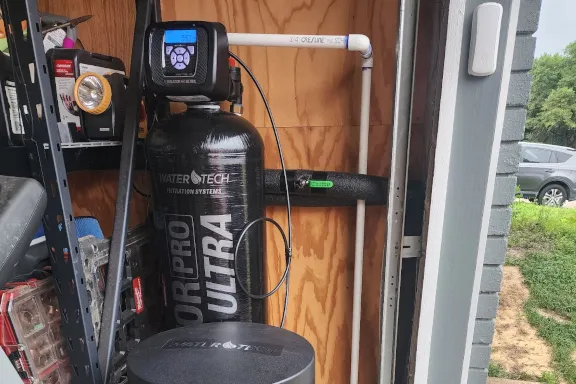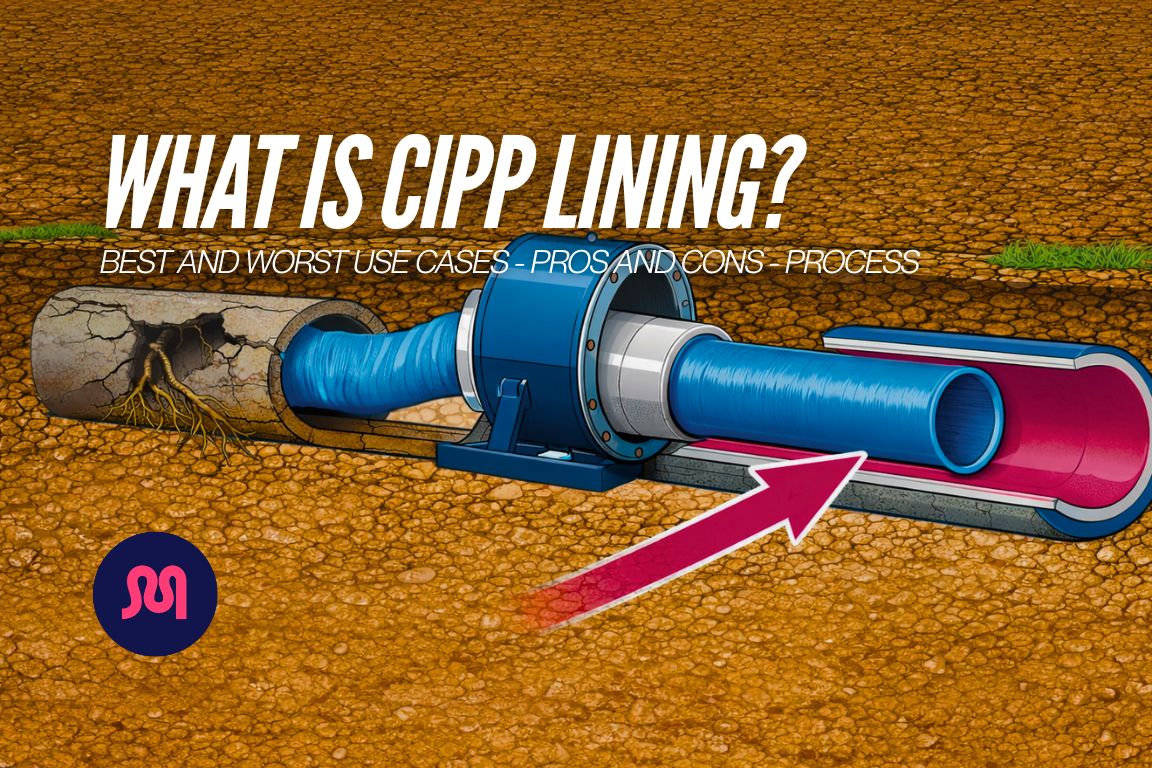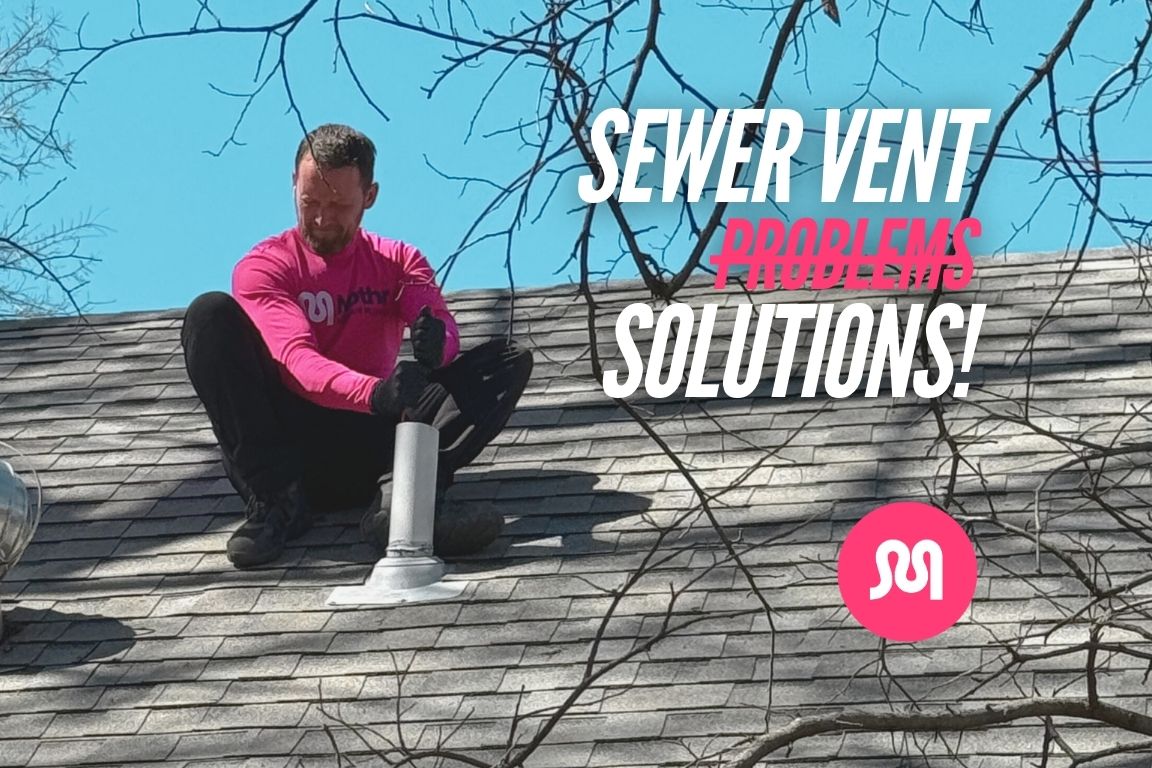What is a Water Conditioner, And What Are The Benefits?

table of contents
table of contents
The home water treatment market is expected to double in size by 2032 to over $8 billion. While many homeowners know the benefits of water softeners and whole house water filters, water conditioning is a lesser known service. So what is a water conditioner?
A water conditioner system changes the form of hard minerals (like calcium and magnesium) in your water supply. Water conditioning reduces scale buildup in your pipes and plumbing fixtures without removing the minerals from your water.
Water conditioners are a good solution for homeowners who want the health benefits of mineral-rich water without the plumbing concerns of scaling and pipe damage. Mother Modern Plumbing works with industry leaders like HALO Water Systems to install certified water conditioners in Dallas-Fort Worth homes.
{{whole-home-water-filtration="/services/whole-home-water-filtration"}}
How Does a Water Conditioner Work?
Water conditioners alter the chemical properties of hard minerals in your tap water. They change the form of calcium, magnesium and calcium carbonate (limescale) so it doesn’t stick to pipes and cause harmful scaling.
By simply changing the form of these hard minerals, water conditioners allow them to remain in your water supply. This allows users to maintain the health benefits of minerals in their drinking water.
What Are the Different Types of Water Conditioners?

There are 3 primary types of water conditioning products, each defined by the process they use to alter the minerals in your water:
- Granular activated carbon filters (GAC)
- Template-assisted crystallization (TAC) filters
- Electromagnetic conditioners
Each of these products offers unique pros and cons in terms of function, size and best use cases (for example, city water vs. well water).
{{how-to-choose-a-whole-house-water-filtration-system="/blogs/how-to-choose-a-whole-house-water-filtration-system"}}
Granular activated carbon (GAC) filters
Granular activated carbon (or GAC) heats up to a high temperature when oxygen isn’t present. This activates the carbon, forming a porous surface over a large surface area. That surface is excellent at absorbing impurities and contaminants in your tap water.
GAC filters offer multi-stage water filtration — the filter’s surface captures large particles, while the granular carbon absorbs dissolved minerals.
What do GAC filters remove?
GAC filters may reduce or remove these materials from your water supply:
- Dirt and sediment
- Chlorine
- Volatile organic compounds (VOCs)
- Pesticides
- Herbicides
Specific water conditioning products offer different filtration standards.
Pros of GAC filters:
- Organic composition. GAC filters are fully organic, usually made from materials like wood and coconut shells.
- Improved taste and odor. GAC filters are great at removing bad odors and tastes from drinking water.
- Relatively low cost. GAC filters are often less expensive than TAC filters and electromagnetic water conditioning units.
Cons of GAC filters:
- Shorter lifespan. Expect to replace GAC filters more often than TAC filters (6-12 months vs. 3-5 years).
- Some contaminants remain. Not all GAC filters remove heavy metals or nitrates from your water. Ask your plumber what your GAC filter brand will handle.
Template-assisted crystallization (TAC) filters
TAC filters use small polymer beads (like the resin beads in a water softener tank) to attract calcium and magnesium ions and pull them away from their chemical bonds.
As hard water flows into your water conditioning system, the TAC filter beads encourage hard mineral ions to crystallize. These crystals continue through your water supply — but their form is better for your plumbing.
When calcium and magnesium ions crystallize, they don’t stick to pipes and plumbing fixtures. You retain the benefits of mineral-rich water without the problem of scaling in pipes.
What do TAC filters remove?
TAC filters remove sediment and convert hard mineral ions to crystalline form.
Don’t expect your TAC filter to reduce or remove heavy metals, chlorine, pesticides or herbicides from your water supply. Its best use is in tandem with a whole house water filter.
Pros of TAC filters:
- Excellent scale protection. TAC filter technology is highly effective at reducing and/or eliminating scaling and mineral buildup in your pipes and plumbing.
- Environmentally friendly. TAC systems do not introduce salt into your water supply or utilize wastewater in any capacity.
- Longer lifespan. TAC filters generally last 3-5 years before replacement is needed.
Cons of TAC filters:
- Upfront cost. TAC filters cost more upfront than GAC filters. This cost is mitigated by the longer lifespan of TAC media.
- No defense vs. contaminants. TAC filters aren’t designed to remove contaminants, viruses or bacteria by themselves. They must be paired with a water filtration system.
Electromagnetic conditioners
Electromagnetic water conditioner technology involves wrapping a coil around your water pipe. This coil produces an electromagnetic field that alters the chemistry of hard minerals in your water supply.
The electromagnetic field interacts with hard water as it passes through your pipe. This field is thought to prevent hard mineral ions from sticking to your pipes.
It’s important to note that electromagnetic conditioning is an evolving science, and not all product claims are fully verified by independent sources at this time.
Pros of electromagnetic conditioning:
- Scale reduction. Initial testing shows some positive correlation between electromagnetic fields and reduced pipe scaling.
- Ease of use. Coils are relatively easy to install and maintain.
Cons of electromagnetic conditioning:
- Evolving technology. Not all claims involving electromagnetism and scaling reduction are proven at this time. Consult with your plumber before making a purchase.
- Power requirement. The use of electromagnetic water conditioners involves a constant power supply to generate the field.
- Cost. The cost of these conditioners varies greatly due to a lack of industry standard pricing, and the consistent use of power.
Benefits of Home Water Conditioner Installation

Home water conditioners offer multiple benefits to consumers across 4 primary categories:
- Improved water quality
- Reduced plumbing maintenance and damage
- Healthy mineral retention
- Eco-friendly use
Water conditioners improve residential water quality
Water quality is a holistic idea — it’s more than just “my water tastes good”. Installing a water conditioner improves overall water quality in 5 facets of daily life:
- Improved taste and smell of drinking water
- Reduced clogging and scaling in plumbing systems
- Efficient appliance function
- Stable water pressure
- Cleaner dishes and laundry
Conditioned water reduces plumbing maintenance and scaling
Water conditioning changes the ionic structure of hard minerals in your tap water. The result — scaling in your plumbing system is reduced to soft water standards.
Softened water reduces strain on water using appliances and scaling in your pipes and fixtures. It also improves the cleaning ability of your dishwasher and washing machine.
The experts at WaterTech note that softened water saves the average household roughly $1,550 per year in costs related to plumbing repair, maintenance and cleaning supplies.
{{home-water-softener-savings="/blogs/home-water-softener-savings"}}
Water conditioners retain healthy minerals in drinking water
Both GAC filters and TAC filters keep calcium and magnesium in your drinking water. These minerals are proven to provide health benefits in humans and pets:
- Calcium promotes muscle function, blood clotting and bone health.
- Magnesium promotes blood sugar and blood pressure regulation, cell regeneration, muscle and nerve function.
Environmental benefits of water conditioner systems
Unlike many water softening systems, water conditioners do not generally use salt to function. This reduces the strain your water treatment system puts on the local environment.
Water conditioning products don’t create wastewater in their filtration process. Water softeners flush out accumulated minerals along with their salt brine.
Water conditioners also don’t require regeneration, reducing the overall water usage in your home and providing energy efficient water treatment.
Is a Water Conditioner Right For Your Home?

Understand that a water conditioner unit is part of an overall water treatment strategy for your home. It’s an ideal way to reduce mineral scaling in your pipes and plumbing fixtures, while keeping healthy minerals in your drinking water supply.
Water conditioners don’t eliminate lead, heavy metals or microorganisms from your water — that requires a water filtration system. We trust brands like HALO Water Systems and WaterTech who provide solutions for both water filtration and conditioning.
Talk to our Dallas-Fort Worth plumbing experts about the benefits of installing a home water conditioner. We’ll talk you through the details, pros and cons, and how conditioned water can benefit your household.
{{whole-home-water-filtration="/services/whole-home-water-filtration"}}




